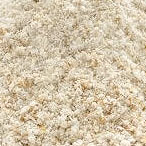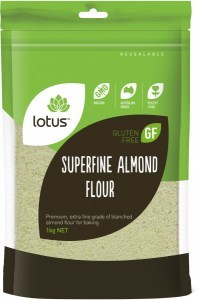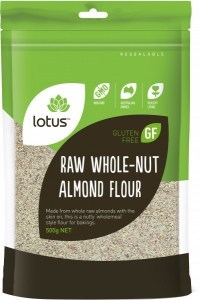
Almond Flour

Made from blanched and peeled almonds that have been ground to a fine consistency, almond flour is a popular wheat-flour substitute in gluten-free baking.
Almonds are blanched in boiling water, skins removed, and ground to a pulp-like consistency that is then sieved to create a fine flour. This process is what makes it different from almond meal, which is simply whole almonds (skin on) that have been ground into a coarse crumb. Almond flour is low in carbohydrates, high in fibre, protein and good fats, and is rich in nutrients making it an ideal healthy substitute to wheat flour.
It’s a popular flour for people with a gluten intolerance thanks to its subtle nutty flavour, easy one-to-one substitution ratio, and nutrient content. With more than 30% the recommended daily intake of vitamin E in just two tablespoons it’s a particularly rich source of this essential fat-soluble antioxidant. In terms of minerals, almond flour is an excellent source of manganese (with just over 30% of the recommended daily intake in two tablespoons), magnesium (19% the recommended daily intake in two tablespoons), copper (16% the recommended daily intake in two tablespoons), and phosphorus (13% the recommended daily intake in two tablespoons).
As a nutrient-dense flour it’s no wonder almond flour boasts a range of health benefits associated with its high vitamin and mineral content. These nutrients are just the start of a range of health benefits associated with this delicious flour.
Benefits of Almond Flour
Heart health
Thanks to its high monounsaturated fat content almond flour is an ideal addition to a healthy diet for anyone who is trying to keep their cholesterol levels in-check. Monounsaturated fat is considered one of the best ‘good’ fats out there, with experts suggesting they can help lower bad (LDL) cholesterol levels.
Studies have repeatedly shown that healthy cholesterol levels can benefit heart health, with the risk of heart disease significantly lower for people with optimum cholesterol levels.
Blood sugar control
As a low-glycemic index food almonds make an excellent addition to a healthy, well-balanced diet. Choosing low-GI foods can help maintain blood sugar levels, reducing spikes in blood sugar and insulin. Avoiding spikes in blood sugar and insulin levels is essential for sufferers of diabetes (type II) but non diabetics can benefit too.
Switching to a low-GI diet can help reduce the risk of developing type 2 diabetes, lower your risk of heart disease, and help maintain a healthy weight.
Promote good digestion
Almonds are rich in dietary fibre and prebiotics, the fuel good bacteria needs to flourish in the gut and create a healthy digestive system.
One study has found the prebiotic benefits of finely ground almonds can withstand the upper intestines without being compromised, showing they can have a significant impact on the body’s beneficial bacteria levels.
Can help you feel fuller, longer
Almond flour is higher in protein than most conventional flours and is rich in dietary fibre, making it more satiating. Its fibre and protein content is ideal for helping you feel fuller for longer, an essential part of a healthy diet and weight management.
Suitable for low-carb and gluten-free diets
Almond flour is a naturally gluten-free substitute for wheat-based flours. An easy one-to-one substitute it is an excellent choice for gluten free baking with the added benefit of a boost of nutrients.
Thanks to its handy one-to-one ratio when substituting in cooking, almond flour is an easy and flavourful ingredient that’s incredibly versatile and adds a boost of nutrients into the mix.
Common uses of Almond Flour
The most common use for almond flour is in gluten-free baking, used in place of wheat flour in muffins, cakes, cookies, breads and slices among other things. But its uses don’t stop there. Almond flour makes for a tasty and healthier crumb for fish or chicken. It can be stirred into soups or stews to thicken them up or used in place of regular flour to create a crisp crust for quiches or tarts.
When used in baking almond flour will create a denser consistency but can help keep baked goods moist. Due to its lack of gluten and rising agents, baking with almond flour can produce a flatter result. And sometimes additional binding agents are required to help keep things together.
Top Selling Almond Flour
Nutrition
Almonds are a powerhouse of nutrients and since almond flour is made up of 100% almonds that have been ground into a fine flour form, almond flour retains all the almonds’ goodness.
Almonds are rich in vitamin E and magnesium and are a good source of iron, manganese, potassium, and calcium. This boost of nutrients is a welcome addition to whole food diets and something typical wheat-based flours are lacking.
Almond flour is rich in nutrients. 28 grams of almond flour contains (3):
- Calories: 163
- Fat: 14.2 grams (9 of which are monounsaturated)
- Protein: 6.1 grams
- Carbs: 5.6 grams
- Dietary fiber: 3 grams
- Vitamin E: 35% of the RDI
- Manganese: 31% of the RDI
- Magnesium: 19% of the RDI
- Copper 16% of the RDI
- Phosphorus 13% of the RDI
Frequently Asked Questions
Is almond flour the same as almond meal?
While they may resemble each other almond flour and almond meal are not the same thing. Almond flour is made by blanching almonds in hot water, removing their skins, then grounding them into a powder before sifting them into a fine flour.
Almond meal is made from skin-on almonds that have been ground down. These almonds are not blanched, they retain their skin, and do no go through the final sifting process to create a finer texture.
Is almond flour the same as ground almonds?
No, almond flour is not the same as ground almonds though the process to create almond flour does involve grinding the almonds down.
Is almond flour gluten free?
Yes, almond flour is naturally gluten free since the flour is created from 100% almonds. The fact that it’s gluten free makes it a very popular flour substitute in gluten-free baking.
Does almond flour go off?
Almond flour can go bad, or rancid, if not stored correctly. Store your almond flour in an airtight container in the pantry and it should last for a few months. Like most things, when kept in the fridge you may be able to extend its shelf life a little more than this and when frozen it will keep even longer.
Almond flour that has ‘gone off’ will smell slightly fishy rather than nutty and needs to be disposed of.
Does almond flour taste like almonds?
Almond flour is made from 100% almonds, mostly retaining the almonds’ original flavour. When processed the end result (the flour) can take on a sweet, nutty flavour. Some people report the flour, when used in baking, produces a slight marzipan flavour.
How to make almond flour
Making almond flour at home is incredibly easy. All you need is a few hundred grams of blanched almonds and a high-speed blender. Process the almonds for about five-minutes or until they reach a fine, powdered texture. Be sure not to blend them for too long though or you’ll end up with an almond butter (which tastes good but is not the consistency you’re looking for…).
Store your almond flour in an airtight container in a cool, dry pantry for approximately 4-weeks, or place in the refrigerator to keep it fresher for longer.

Lotus Superfine Almond Flour 1kg
Lotus Superfine Almond Flour has been ground twice to produce a very fine almond meal perfect as an low carb flour for baking. Naturally gluten and grain free, this flour is created for lighter and more delicate baked goods. Try combining with other flours to cut through over-starchiness of other GF flours.
Ingredients: Blanched finely ground almonds
Shop nowAlmond flour is a popular choice in gluten-free baking and for anyone following a keto diet, low-carb diet, or used in place of breadcrumbs or wheat flour for those looking for a boost of nutrients in their diet. It’s a versatile and easy to use flour with a one-to-one ratio when substituting for regular flour.
Boasting an impressive nutrient content, including vitamins, minerals, and is an excellence source of fibre and prebitocs, almond flour is an excellent choice for anyone following a whole foods diet. While it’s high in calories and fat, their nutrient content and the fact the fats are ‘good’ fats means you can reap a host of benefits from including almond flour in a well-balanced diet.
For type 2 diabetics, celiacs, and anyone looking to maintain healthy blood sugar and cholesterol levels, almond flour has proven to be an excellent choice.





